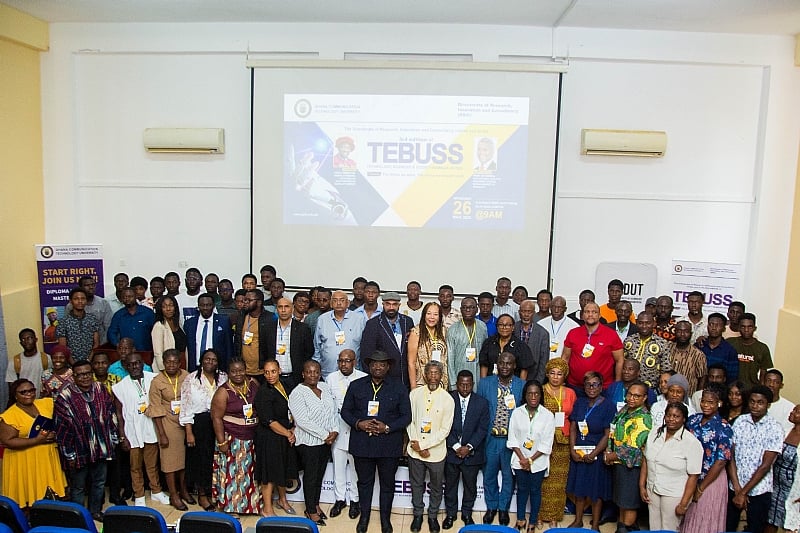Professor Fulufhelo Netswera, the Executive Dean of the Faculty of Management Sciences at Durban University of Technology (DUT), lauded Ghana Communication Technology University (GCTU) for its unwavering commitment to promoting Information and Communication Technology (ICT) as the cornerstone of societal transformation. Speaking at the 3rd Technology, Business, and Society Seminar Series (TEBUSS) hosted by GCTU, themed “The Africa We Want, The Africa We Should Claim,” Professor Netswera emphasized the critical role of ICT in shaping the future, echoing GCTU’s vision. He underscored the importance of equipping students with the necessary skills and competencies to navigate the complexities of the digital age, emphasizing that ICT proficiency is no longer just an advantage, but a necessity for success in the modern world.
Professor Netswera’s address pivoted around a crucial observation: the inadequacy of traditional knowledge-based education in preparing students for real-world challenges. He argued that a purely theoretical approach, while important, fails to bridge the gap between knowledge and practical application. He pointed out that the assumption that knowledge inherently translates into skills is a flawed premise. To address this disconnect, DUT has adopted a revolutionary approach, reversing the conventional knowledge-to-skill model by prioritizing skill acquisition first. This skills-based approach, he argued, is not merely a pedagogical shift, but a strategic imperative for Africa’s development, directly contributing to job creation, fostering innovation, and driving economic growth. However, he acknowledged the inherent challenge lies not in conceptualizing new educational models, but in their effective implementation.
Professor Emmanuel Ohene Afoakwa, Vice-Chancellor of GCTU, reinforced Professor Netswera’s sentiments, emphasizing GCTU’s mission to develop dynamic academic programs that are responsive to the evolving needs of industry and society. While acknowledging the persistent challenges facing Africa, including hunger, poverty, and educational deficits, Professor Afoakwa emphasized that these very challenges represent opportunities for innovation and growth. He viewed them not as insurmountable obstacles, but as catalysts for creative solutions and technological advancements. He highlighted the importance of leveraging technology and education to address these challenges, ultimately transforming Africa into a continent of progress and prosperity.
Professor Afoakwa also underscored the fruitful partnership between GCTU and DUT, which has facilitated staff training, joint research initiatives, and the publication of ten research papers. This collaboration, he stated, has significantly strengthened GCTU’s academic programs and paved the way for further research and capacity building, showcasing the power of inter-institutional partnerships in driving academic excellence. This collaborative spirit, he emphasized, is essential for achieving the shared vision of a transformed Africa.
The TEBUSS seminar served as a vibrant platform for intellectual exchange, bringing together leading figures from academia, industry, and government, including a fifteen-member delegation from DUT. The event featured a rich array of keynote presentations, panel discussions, and networking opportunities, fostering a collaborative environment for knowledge sharing and the exploration of innovative solutions. The diverse perspectives shared contributed to a comprehensive understanding of the challenges and opportunities facing Africa, highlighting the potential of technology to drive positive change.
In his closing remarks, Professor Afoakwa reiterated the importance of forging stronger partnerships, emphasizing that Africa’s future hinges on educational institutions embracing their role as hubs for innovative solutions that propel progress. He envisioned a future where African universities are not just centers of learning, but also engines of innovation, driving economic growth, addressing societal challenges, and shaping a brighter future for the continent. The seminar concluded with a renewed commitment to collaborative action, recognizing the power of collective effort in realizing the shared vision of “The Africa We Want, The Africa We Should Claim.”














